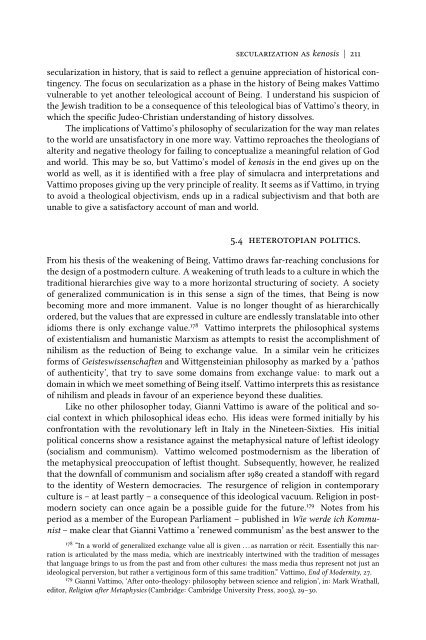Secularization as Kenosis
Secularization as Kenosis
Secularization as Kenosis
Create successful ePaper yourself
Turn your PDF publications into a flip-book with our unique Google optimized e-Paper software.
secularization <strong>as</strong> kenosis | 211<br />
secularization in history, that is said to reflect a genuine appreciation of historical contingency.<br />
The focus on secularization <strong>as</strong> a ph<strong>as</strong>e in the history of Being makes Vattimo<br />
vulnerable to yet another teleological account of Being. I understand his suspicion of<br />
the Jewish tradition to be a consequence of this teleological bi<strong>as</strong> of Vattimo’s theory, in<br />
which the specific Judeo-Christian understanding of history dissolves.<br />
The implications of Vattimo’s philosophy of secularization for the way man relates<br />
to the world are unsatisfactory in one more way. Vattimo reproaches the theologians of<br />
alterity and negative theology for failing to conceptualize a meaningful relation of God<br />
and world. This may be so, but Vattimo’s model of kenosis in the end gives up on the<br />
world <strong>as</strong> well, <strong>as</strong> it is identified with a free play of simulacra and interpretations and<br />
Vattimo proposes giving up the very principle of reality. It seems <strong>as</strong> if Vattimo, in trying<br />
to avoid a theological objectivism, ends up in a radical subjectivism and that both are<br />
unable to give a satisfactory account of man and world.<br />
5.4 heterotopian politics.<br />
From his thesis of the weakening of Being, Vattimo draws far-reaching conclusions for<br />
the design of a postmodern culture. A weakening of truth leads to a culture in which the<br />
traditional hierarchies give way to a more horizontal structuring of society. A society<br />
of generalized communication is in this sense a sign of the times, that Being is now<br />
becoming more and more immanent. Value is no longer thought of <strong>as</strong> hierarchically<br />
ordered, but the values that are expressed in culture are endlessly translatable into other<br />
idioms there is only exchange value. 178 Vattimo interprets the philosophical systems<br />
of existentialism and humanistic Marxism <strong>as</strong> attempts to resist the accomplishment of<br />
nihilism <strong>as</strong> the reduction of Being to exchange value. In a similar vein he criticizes<br />
forms of Geisteswissenschaften and Wittgensteinian philosophy <strong>as</strong> marked by a ‘pathos<br />
of authenticity’, that try to save some domains from exchange value: to mark out a<br />
domain in which we meet something of Being itself. Vattimo interprets this <strong>as</strong> resistance<br />
of nihilism and pleads in favour of an experience beyond these dualities.<br />
Like no other philosopher today, Gianni Vattimo is aware of the political and social<br />
context in which philosophical ide<strong>as</strong> echo. His ide<strong>as</strong> were formed initially by his<br />
confrontation with the revolutionary left in Italy in the Nineteen-Sixties. His initial<br />
political concerns show a resistance against the metaphysical nature of leftist ideology<br />
(socialism and communism). Vattimo welcomed postmodernism <strong>as</strong> the liberation of<br />
the metaphysical preoccupation of leftist thought. Subsequently, however, he realized<br />
that the downfall of communism and socialism after 1989 created a standoff with regard<br />
to the identity of Western democracies. The resurgence of religion in contemporary<br />
culture is – at le<strong>as</strong>t partly – a consequence of this ideological vacuum. Religion in postmodern<br />
society can once again be a possible guide for the future. 179 Notes from his<br />
period <strong>as</strong> a member of the European Parliament – published in Wie werde ich Kommunist<br />
– make clear that Gianni Vattimo a ‘renewed communism’ <strong>as</strong> the best answer to the<br />
178 “In a world of generalized exchange value all is given . . . <strong>as</strong> narration or récit. Essentially this narration<br />
is articulated by the m<strong>as</strong>s media, which are inextricably intertwined with the tradition of messages<br />
that language brings to us from the p<strong>as</strong>t and from other cultures: the m<strong>as</strong>s media thus represent not just an<br />
ideological perversion, but rather a vertiginous form of this same tradition.” Vattimo, End of Modernity, 27.<br />
179 Gianni Vattimo, ‘After onto-theology: philosophy between science and religion’, in: Mark Wrathall,<br />
editor, Religion after Metaphysics (Cambridge: Cambridge University Press, 2003), 29–30.










